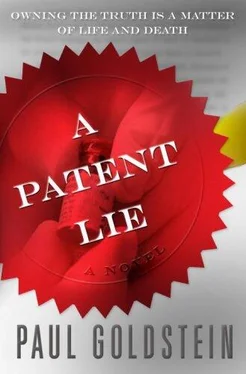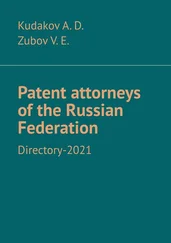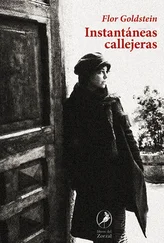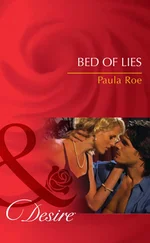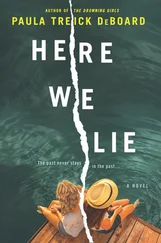Paul Goldstein - A Patent Lie
Здесь есть возможность читать онлайн «Paul Goldstein - A Patent Lie» весь текст электронной книги совершенно бесплатно (целиком полную версию без сокращений). В некоторых случаях можно слушать аудио, скачать через торрент в формате fb2 и присутствует краткое содержание. Жанр: Криминальный детектив, на английском языке. Описание произведения, (предисловие) а так же отзывы посетителей доступны на портале библиотеки ЛибКат.
- Название:A Patent Lie
- Автор:
- Жанр:
- Год:неизвестен
- ISBN:нет данных
- Рейтинг книги:3 / 5. Голосов: 1
-
Избранное:Добавить в избранное
- Отзывы:
-
Ваша оценка:
- 60
- 1
- 2
- 3
- 4
- 5
A Patent Lie: краткое содержание, описание и аннотация
Предлагаем к чтению аннотацию, описание, краткое содержание или предисловие (зависит от того, что написал сам автор книги «A Patent Lie»). Если вы не нашли необходимую информацию о книге — напишите в комментариях, мы постараемся отыскать её.
A Patent Lie — читать онлайн бесплатно полную книгу (весь текст) целиком
Ниже представлен текст книги, разбитый по страницам. Система сохранения места последней прочитанной страницы, позволяет с удобством читать онлайн бесплатно книгу «A Patent Lie», без необходимости каждый раз заново искать на чём Вы остановились. Поставьте закладку, и сможете в любой момент перейти на страницу, на которой закончили чтение.
Интервал:
Закладка:
There was a rustling in the shrubbery across the tracks and, when Seeley turned, a hulking presence emerged from the foliage. Moonlight glinted off the silvery white bone of a modest rack of antlers, and the instant the buck saw him, it froze. The two of them remained absolutely still, studying each other. Ears twitching, depthless eyes alert, the buck heard the locomotive before Seeley did, and by the time the train was upon him, the only evidence of the buck's appearance was the receding white bun of a tail bounding between two dark warehouses.
The moon-size headlamp of the locomotive passed in an instant, followed by a racket of driven steel and the hellish reek of fire, oil, and pulverizing metal. The force of the rocketing cars was like an arm's blow across Seeley's chest.
As if crystallized from the blast of sweet night air that trailed the train's passage, a thought dropped into Seeley's head. The thought-it sent a shiver through him-was that the motive for Robert Pearsall's murder lay not in Warshaw's perspiring progress up and down a football field, measuring every yard of his team's advance and retreat, but in the entrepreneur's observation at a charity auction that the two bleeding warriors should split their bid. It was a spark of intuition, nothing more. But if it was true, then everything Seeley had accomplished in the trial so far was now irrevocably going to recoil back at him.
The juniper fragrance of gin blossomed on Seeley's tongue, and he craved a drink-gin, vodka, scotch, anything so long as it was alcohol. The dark sedan, when he went into the street to look for it, was gone.
SEVENTEEN
Seeley slept little and spent most of the night and early morning sorting, arranging, and rearranging facts, rejecting some, adding others-each one felt like the touch of a dentist's drill-to the gradually expanding picture. If he was right, Leonard's purchase of Vaxtek stock had not been profligate at all, but was the sort of shrewd, cowardly calculation that he expected of his brother. Alan Steinhardt's secrets were trivial when compared to Emil Thorpe's. How many other facts still escaped his grasp? What did Chris Palmieri know?
Rain poured steadily outside the hotel window as Seeley dressed. He borrowed an umbrella from the desk clerk, but passed up the hotel taxi line to walk the mile to Battery Street and the office. Abandoned on an early Sunday morning, the streets and sidewalks of the financial district underlined in thick charcoal strokes the isolation that Seeley now felt from his client and his case. Rain silvered the gray buildings and streamed onto the sidewalks. What client, Seeley thought. What case?
A war room in the middle of trial would ordinarily be a shambles of notebooks, half-used legal pads, and the remains of Chinese takeout, but Tina had done a good job keeping papers filed and notebooks reshelved. When Seeley came into the conference room, Palmieri was already there, his back to the rain-streaked glass, studying the black deposition binder for Thomas Koosmann, the Washington University epidemiologist who would be Thorpe's first witness tomorrow morning. In chinos, loafers, and polo shirt, his face flushed with health, Palmieri looked like he had come directly from a workout at his gym. A sweater was draped over his slender shoulders.
Seeley glanced quickly through the papers that Palmieri slid across the polished tabletop. There was a summary of Koosmann's deposition, proposed questions for cross-examination, and a memo from a junior associate at Heilbrun, Hardy collecting gossip from lawyers around the country about the epidemiologist's tics and foibles as a witness. Seeley pushed them to the side.
“How do you think we're doing, Chris?”
“Pretty well. We've taken a few hits, but the jury looks like it's with us.”
“Do you think we're doing too well?”
The question should have surprised Palmieri, but for a long moment it didn't, and this indicated to Seeley that his second chair already knew what he himself had just begun to piece together.
Finally Palmieri said, “What do you mean?”
“Why didn't you tell Chaikovsky that she had no choice-that she had to stay at a hotel in the city?”
Palmieri reddened. He had a habit, when defending himself, of closing his eyes and pushing back from the table, and he started doing this now, but caught himself. “I didn't think it was important. She told me she always got up early and there wouldn't be any problem making it to court in time.”
“Why did you wait until the last minute, when Steinhardt was about to perjure himself, before you showed me the discrepancy between his lab notes and his travel dates?”
Palmieri shot out of the chair, his eyes fierce. “You've been after me since that mistake with your pro hac papers.”
If there wasn't a conference table between them, Seeley was sure the young partner would have lunged at him.
“If you think I'm not carrying my weight, then run the damn case by yourself. That's pretty much what you've been doing anyway.”
A gust of wind drove a sheet of rain in crazed patterns across the glass. Instinct told Seeley not only that Palmieri knew that Vaxtek and St. Gall had made a deal, but also that the young partner had reacted to it just as Seeley had: he had no choice but to sabotage his own client's case.
“I'm sorry, Chris.” He waited for Palmieri to take his chair again. “My point wasn't to criticize you.”
“Whatever your point was, you certainly did a good job disguising it.”
Seeley knew that if he couldn't tell Palmieri about his suspicions, he could tell no one. He had weighed the alternatives for, it seemed, most of last night. There was the risk, a real one, that Palmieri was himself a part of the puzzle, just one that Seeley had not yet connected to the rest. But the fact remained that if completing the trial was the only way Seeley could reverse what had happened, he could not do so without Palmieri's help.
Watching Palmieri for his reaction, Seeley said, “I think this is a collusive lawsuit. I think Vaxtek and St. Gall set this case up between them to get a court to hold that the AV/AS patent is valid, and then to split the profits.”
The young lawyer's expression revealed nothing. Seeley had given him too much time to prepare himself.
Palmieri said, “And you think I'm part of this collusion.”
“No,” Seeley said, “just the opposite. I think you're trying to sabotage their deal. You're trying to wreck Vaxtek's case so the jury will vote against the patent.”
Palmieri pushed back from the table, and this time closed his eyes. “Why would they need to collude?”
Palmieri didn't trust him and, for that reason, wouldn't admit that he knew about the collusion or that he had done anything to obstruct it. Otherwise, Seeley thought, he just would have told him that he was wrong, and that he wasn't trying to undermine the deal between the two companies.
“Let's say…” To his surprise, Seeley found that his heart was racing. He took a breath and started over. “Let's say that a small pharmaceutical company develops a blockbuster drug and gets a patent on it. Time passes. The company's chairman receives a visit from an executive at another pharma company, but this one's a giant, a multinational.”
Seeley remembered Leonard's story about his encounter with St. Gall's head of research at a scientific conference. We're going to crush you.
“We can copy AV/AS, the executive tells Warshaw, and you can sue us for patent infringement. We would put on a strong defense and, with our resources, we'd overpower you. In all probability we'd convince a jury that your patent's invalid. But how would that benefit us? AV/AS would no longer be protected by a patent, and anyone would be free to manufacture it. After you spent all this money to develop AV/AS, and we made our lawyers rich, where would that leave the two of us? We'd be scrambling to compete with the generic houses to sell AV/AS at Wal-Mart prices.”
Читать дальшеИнтервал:
Закладка:
Похожие книги на «A Patent Lie»
Представляем Вашему вниманию похожие книги на «A Patent Lie» списком для выбора. Мы отобрали схожую по названию и смыслу литературу в надежде предоставить читателям больше вариантов отыскать новые, интересные, ещё непрочитанные произведения.
Обсуждение, отзывы о книге «A Patent Lie» и просто собственные мнения читателей. Оставьте ваши комментарии, напишите, что Вы думаете о произведении, его смысле или главных героях. Укажите что конкретно понравилось, а что нет, и почему Вы так считаете.
